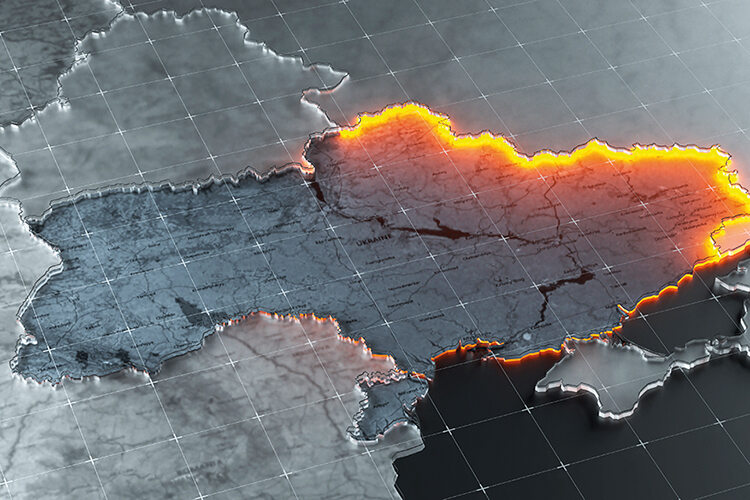


Tim Marshall considers the worrying fractures appearing in the European and American support of Ukraine
The cracks in support for Ukraine’s fight against Russia continue to show. How much they widen depends partly on the result of the American presidential election and partly on who wins the debate in Europe about what’s at stake. The costly failure of Ukraine’s counter-offensive last summer, followed by Russian gains this year, mean that conversations are taking place about what an acceptable end to the war would look like. In public, however, the supportive rhetoric continues.
An EU summit in Berlin in June welcomed deepened commitments to arm Ukraine and admit it into the union. Kyiv is to receive ¤1.5 billion in frozen Russian assets held in European banks as part of the eventual rebuilding of Ukraine.
‘Putin must fail. Ukraine must prevail,’ said European Commission president Ursula von der Leyen. It’s a good soundbite, up there with President Biden’s ‘Nothing about Ukraine without Ukraine’, but outside of the White House and EU institutions, not everyone agrees.
The results in June’s European parliament elections showed a surge in support for hard-right parties, which won a record number of seats. Some are sceptical about increasing aid for Ukraine, while others want to stop it and force Kyiv to the negotiating table. In France, Marine Le Pen’s National Rally, which is at best ambiguous about continuing support, trounced President Macron’s Renaissance party. In Germany, the AfD, which opposes aid to Ukraine, won more votes than any of the governing parties. The nationalist hard-left party led by Sahra Wagenknecht, which is pro-Russia, also gained support. The biggest losers were the Greens – Germany’s most hawkish party since the war began. In Austria, the Freedom Party won the most votes. Its slogan was ‘Stop the EU Madness’ and posters featured a ruinous backdrop showing a tank and a migrant boat. It said the EU was ‘warmongering’. Austria may be neutral, and so doesn’t send weapons to Ukraine, but it’s a player within the EU, and that’s why these election results may have an effect.
The European Commission and the majority of the European Parliament remain pro-Ukraine, but in each member state, governing politicians are looking at the rise in support for the right and may feel pressure to tack to the prevailing wind. Some sceptical parties could gain influence over national governments or even take power. In 2023, the Dutch elections saw Prime Minister Mark Rutte ousted and a new government formed, including Geert Wilders’ Party for Freedom, which is lukewarm on aid for Ukraine.
The German election is next year, and Austrians will go to the polls this September. A win for the Freedom Party could see the country join Hungary and Slovakia in calling for negotiations with Russia to end the war. Hungary’s prime minister, Viktor Orban, has frequently tried to block EU sanctions against Russia and moves to support Ukraine. He has just taken over the chair of the European Council of EU heads of government and so can influence the foreign and security policy agenda.
The Europeans, and indeed President Putin, are waiting for the result of the American election before showing their hands. A Democrat win would probably mean a continuation of support; a Trump victory would probably mean the opposite. Two of his key foreign policy advisors have already drawn up a plan in which a ceasefire is based on current battlefield lines. Ukraine will only receive aid if it enters peace talks, while if Russia refuses to negotiate on a ’land for peace’ deal, then aid to Ukraine would be increased.
America removing support would concentrate European minds. Many leaders believe the security of the continent depends on the outcome of this war but have failed to articulate this. They’ve also failed to build a European defence industry, which could step in if American supplies dry up. The Europeans urgently need to step up and make decisions about whether they could attempt to continue military support. And whether they want to.
Consider just a fraction of what the Americans have sent so far: a Patriot air defence battery, 40,000 grenade launchers, 400,000 mortar rounds, 400 million rounds of small arms ammunition, 18 armoured bridging systems, 200 Bradley infantry fighting vehicles, 500 armoured personnel carriers, 3,000 Humvees… Europe can match the money America sends, but not the military equipment. More than half of all military kit received by Ukraine is American.
A core of countries, including the UK, Poland, Finland, Sweden, and the Baltic states, could try to continue support, but many others would fall into line with the USA, some reluctantly, others with a sigh of relief.




